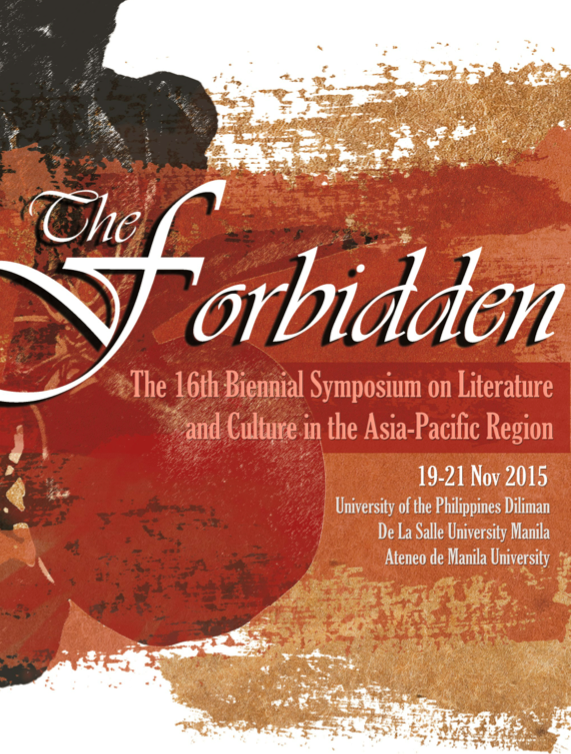 Mr. Janus Isaac V. Nolasco, University Researcher at the UP Asian Center, presented a paper on an enduring motif in Philippine literature and culture at “The Forbidden: the 16th Biennial Symposium on the Literature and Culture in the Asia-Pacific Region” (LCAP), which was held from 19 to 21 November 2015 at three different universities in Metro Manila.
Mr. Janus Isaac V. Nolasco, University Researcher at the UP Asian Center, presented a paper on an enduring motif in Philippine literature and culture at “The Forbidden: the 16th Biennial Symposium on the Literature and Culture in the Asia-Pacific Region” (LCAP), which was held from 19 to 21 November 2015 at three different universities in Metro Manila.
Below is an abstract of Mr. Nolasco’s paper, entitled “Poor Girl, Rich Daughter: The Politics of Illicit Affairs in Marivi Soliven’s ‘The Mango Bride'.”
“One of the enduring, if not most disparaged motifs in Philippine popular culture is what I call "The Poor Girl, Rich Daughter." The bastard offspring of an illicit affair between a wealthy man and an indigent woman, the poor-girl-rich-daughter grows up in less than affluent conditions. Her true parentage is often hidden, and only in the end will she discover her lineage and/or come to know a wealthier life with her rich father. Adopting the notion of art as an "imaginary resolution of social contradictions" and examining Marivi Soliven's "The Mango Bride," I suggest that the motif reflects and subverts one of the perennial problems in Philippine society: the concentration of political and economic power in the family, and the resultant class divisions and the unequal distribution of wealth. This institutional arrangement ties kinship to the attainment of prosperity. And by granting a poor girl a noble lineage, the motif gives her an unassailable claim to wealth and power. This symbolic resolution of social inequalities, I argue further, is part of the novel's overall assault on rigid hierarchies, which is exemplified by its narrative style, structure, and other formal elements.”
The paper, which is part of the panel on "Forbidden Love," is based on a review essay of the Palanca award-winning novel, “The Mango Bride” that Mr. Nolasco wrote for "The Manila Review." He has a BA in Comparative Literature and majored in West Asian studies for his Masters degree at the UP Asian Center. Mr. Nolasco is also the Managing Editor of Asian Studies: Journal of Critical Perspectives on Asia.
The 2015 LCAP Symposium sought to examine “[the] implications [of the forbidden] specifically for the literatures, cultures, and perspectives of the Asia-Pacific region seen by scholars on and in the region. It invites research on impropriety in all its forms, from mischief and rule-breaking to crime, sin, and subversion. It also celebrates writing itself as a dangerous or deadly habit, a form of deviant behavior, infiltration, or transgression.”
The 2015 LCAP Symposium was sponsored by and held in the English Departments of the University of the Philippines Diliman, the Ateneo de Manila University, and De La Salle University. It drew participants from several Southeast Asian countries, including Singapore, Indonesia, and Malaysia.
To learn more, read the conference Call for Papers posted at the website of the Department of English and Comparative Literature, University of the Philippines Diliman.
The Asian Center offers M.A. degrees in Asian Studies with four fields of specialization: Northeast Asia, Southeast Asia, South Asia, and West Asia. The Center also has an M.A. program in Philippine Studies that allows students to major in Philippine society and culture, Philippine foreign relations, or Philippine development studies. The Center offers a Ph.D. program in Philippine Studies in conjunction with the College of Arts and Letters and the College of Social Sciences and Philosophy. For an overview of these graduate programs, click here. The Asian Center also publishes Asian Studies: Journal of Critical Perspectives on Asia, the latest issue of which can be downloaded at the journal's website. View recent and upcoming Lectures & Conferences and read other News & Announcements. Join our mailing list to receive invitations to lectures, conferences, etc.

